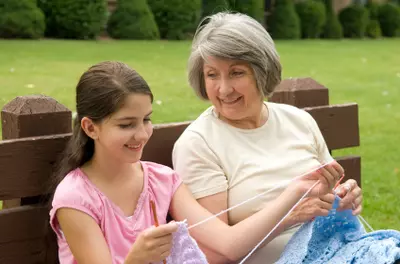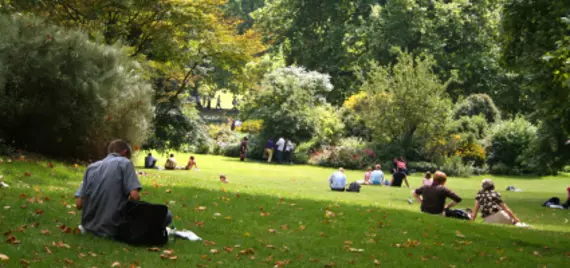Work Your Networks to Improve Community Wellbeing

Social networks allow us to accomplish what we can’t on our own and offer great benefit to the whole community. Research shows that vibrant social networks help lower crime rates, increase public health, and reduce political corruption—among other things. As such, they provide an essential tool to improve community wellbeing.
Use your networks to effect change
There are times when we see issues of injustice or inequity in our community that we want to change. We may want to help children struggling in school or coming to school hungry, or address homelessness in our city, or fight the placement of a garbage burner in a neighborhood already burdened by poverty.
Achieving goals such as these is easier if we use our social networks to engage others. In the book, Better Together: Restoring the American Community, the author Robert Putnam tells us that the best way to involve other people is to use our friendship networks.
For example, in the "do.town" community project initiated by Blue Cross in MN, 58% of the people who participated came because of a personal connection, rather than a desire to improve their own physical health. So relationships and interpersonal connections are essential tools in effecting change.
Existing personal networks motivate people to participate even more than their ideological commitment or even their self-interest.
How to engage your network
You need to explicitly ask people to participate!
- For your initial steps, start with your own social networks, where you can build stronger bonds of trust and commitment.
- Then expand your existing network. Find groups that may have the different motives, but the same goals. For example, a group that is advocating for bike paths to promote physical activity in the community might join up with a group that wants to address climate change. Build bridges to those other groups.
Examples of using networks for change

Grassroots recycling program
A recycling company began when a group of citizens joined together.
Grassroots Recycling
Eureka Recycling in St. Paul, Minnesota is a zero-waste recycling company built entirely upon the efforts and dedication of the community. In fact, the company began nearly twenty years ago when a group of citizens joined together to implement energy conservation programs around the city. Since then, it has grown to become a leader in recycling organizations. With the community as its only shareholder, Eureka is able to invest any profits back into local educational initiatives, public projects, and outreach.
What would you do?
Look around where you live. What changes would you make in your community? What resources would you need to make that change possible?
Try talking to neighbors and other community members to see if you can generate interest in your cause—and don’t get discouraged. Many powerful movements start with one person who stands up for social or environmental change.

Grandparent outreach
A grandmother in Texas organized to provide an after school program for children in her community.
Grandparents Outreach
Lou Ann Freas, grandmother of twelve, was shocked to hear that hundreds of children in her Texas neighborhood were “latchkey kids,” meaning they spent hours alone every day after school, waiting for their parents to return from work.
Rather than sit back and ignore the problem, Lou Ann decided to see if she could do something to help—and an idea came to her: Grandparents Outreach. The project would partner two parts of the community—latchkey kids and senior citizens—and develop an afterschool program where kids could spend time with the older community.
The benefits for both groups was clear—the children would have a place to go after school and would be provided help with their homework, games, and snacks, while the retired community could enjoy an opportunity to stay active and fueled by purpose.
Lou Ann advertised her project at a local home show, where she attracted interest from the retired community and local school districts. A nearby church offered its reception hall free of charge each afternoon, and an owner of several fast-food franchises donated a generous amount to train the senior citizens in childcare and hire a day-care professional to be on staff.
Grandparents Outreach opened its doors in 1989 and very quickly reached its maximum capacity, with forty children coming each day to spend time with the older community until their parents were home from work. Inspired by Lou Ann’s idea, others have organized similar outreach centers in cities across the country.
Reference:
Fiffer, S., Fiffer, S.S. (1994). 50 ways to help your community. New York: Doubleday.
Influence your network
Networks influence us, but we also have a strong influence on others. Christakis presents a large and varied body of evidence demonstrating that we all have a big impact on the people around us. “The ubiquity of human connection means that each of us has a much bigger impact on others than we can see. When we take better care of ourselves, so do many other people. When we practice random acts of kindness, they spread to dozens or even hundreds of other people.”
So make your good behavior visible!
Think about what behavior you are modeling in your social network. Choose to act in ways that increase the trust, reciprocity, and altruism in the community.
Aim for equity in social networks
Social networks are a valuable resource for all of us, and we should aim to include everyone so that they can benefit.
As Christakis powerfully writes in Connected, “our connections matter much more than the color of our skin or the size of our wallets. To address differences in educations, health, or income, we must also address the personal connections of the people we are trying to help. To reduce crime, we need to optimize the kinds of connections potential criminals have….to make smoking-cessation and weight-loss interventions more effective, we need to involve family, friends, and even friends of friends. To reduce poverty, we should focus not merely on monetary transfers or even technical training; we should help the poor form new relationships with other members of society.”
We can all aim to create bridging ties to people outside our normal social networks. One effective way to do this is through the arts. As Putnam notes in Better Together, evidence shows that “creative and performing arts bring together more ethnically diverse participants than any other type of association.” So look for ways to engage in arts in your community and offer the opportunity to do so to all groups.
Christakis, N., Fowler, J. (2009). Connected. New York: Little, Brown, and Company.
Helliwell, J., Putnam, R. (2005). The social context of well-being. In Huppert, F., Baylis, N., Keverne, B. (Eds.), The science of well-being. Oxford: Oxford University Press.
Miller, W. D. (2011). Healthy homes and communities: Putting the pieces together. American Journal of Preventive Medicine, 40(1), S48.
O'Brien, M.S. (2002). Social capital and sense of community: The relationship of individual perceptions of community social dynamics and fear of crime. Dissertation Abstracts International.B.the Sciences and Engineering, 63(4-B), 2109.
Putnam, R. D. (2001). Bowling alone: The collapse and revival of American community. New York: Simon & Schuster.
Putnam, R. D., & Feldstein, L. (2004). Better together: Restoring the American community. New York: Simon & Schuster.







